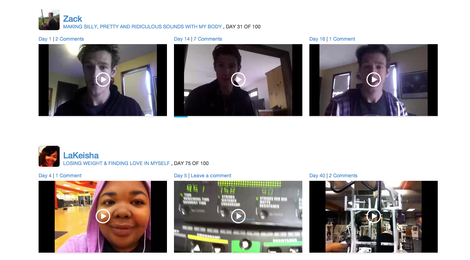How a YouTube Video Completely Changed the Lives of Two Strangers
A year ago, Karen Cheng didn't know how to dance. The 25-year-old San Francisco web designer wanted to learn, but didn't find studio lessons all that compelling. Instead, she turned to YouTube and forced herself to learn some moves, and document every day of her progress for an entire year.
The result was this:
Not only did Cheng, now 26, master popping and locking, her video went viral and she was able to quit her job and start her own company based on the concept of documenting goals. The name of her site is "100" (GiveIt100.com). It was created in partnership with software developer Finbarr Taylor, and it enables people to try something new and chronicle their experience within a community of other experimenters.
"The video has totally changed the trajectory of my life," Cheng tells us. "Now, I'm doing something that could actually make a difference, " and that's exactly what 100 is doing.
Ask Cynthia Abrams. Eighty-two days ago, somewhere in Chicago, Abrams, 52, watched Cheng's YouTube video and felt inspired to take on a mission of her own: learning to walk again. Abrams was paralyzed after developing a lesion on her spinal chord; she describes her condition "like Christopher Reeve's." Seeing Cheng dramatically overcome a hurdle simply through discipline and practice, Abrams believed she could also transform her life.
Nearly 100 days later, Abrams is almost walking again. Watch her here:
"I'm very excited to say that I am so close to walking," Abrams explains to us. "I can do 10 steps, so obviously I can't go out and public and strut my stuff down the street, but I'm able to walk with a walker or a cane."
Cheng and Abrams have since become acquainted and shared their stories with one another. Abrams' video is part of Cheng's 100 project, where it sits besides the videos of other trying to learn handstands, lose weight, draw, pick up a new language, and play guitar. Abrams describes Cheng and her crew as a "gift," people who helped her realize her goal of regaining independence.
"They were so affirming, and so positive and so excited to have my presence involved in their project," Abrams recalls. "That was really flattering and meaningful to me. It was such a gift and an honor. One of the things that is really hard about my experience with the disease is that I was so dependent on people. It really gave me lessons about acceptance and staying in the moment."
For Cheng, she's well on her way to becoming the Mark Zuckerberg of social video networks, though she defines 100 as the "anti-Facebook." It's not a place for the self-righteous, but a community that rises and falls together. A place where people share their struggles and triumphs, where the journey to success is paved before the world.
"When I'm on the site, I feel a close personal relationship with people that I don't on a social network," Cheng says. "Because 1) you see them every day; 2) they're working towards something not just eating; and 3) there's a struggle. You have to show your mistakes. There's no safe place. Facebook everyone is posting about how awesome their life is. I want this place to have both sides."

She adds, "I'd love to see the next Michael Jordan, the next Mark Zuckerberg, the next Lady Gaga…In five years, after winning that gold medal, bringing in those millions of fans, you'll be able to see that first step and all the days along the way. You'll be able to see that where they are is the culmination."
